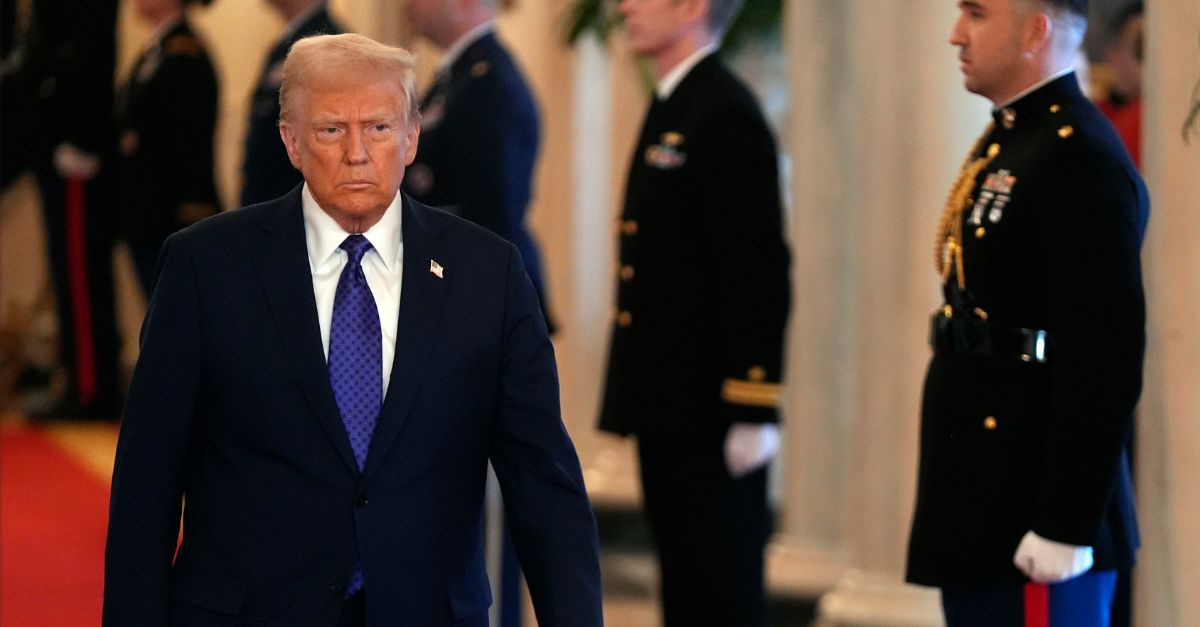
President Donald Trump arrives to sign the Laken Riley Act in the East Room of the White House, Wednesday, Jan. 29, 2025, in Washington. (AP Photo/Evan Vucci)
A coalition of Democratic attorneys general is urging a federal appeals court in Massachusetts to reject a request from the Trump administration that would allow the government to begin implementing and enforcing the president’s executive order seeking to end birthright citizenship.
In a 22-page opposition motion filed Tuesday in the Boston-based U.S. Court of Appeals for the First Circuit, the states argued that the panel of appellate judges should not overturn the preliminary injunction issued last month by U.S. District Judge Leo T. Sorokin, asserting that Trump’s birthright citizenship order would upend more than a century of practical and legal precedent and create chaos.
“The federal government has recognized the citizenship of children born in the United States to undocumented or non-permanent immigrants for over 100 years, a practice that was unchallenged until January 2025,” the filing states. “In granting a preliminary injunction below, the district court did no more than maintain the century-old status quo pending resolution of this case on the merits. Every court to consider a challenge to the recent Executive Order upending birthright citizenship has granted preliminary relief, given both the irreparable and profound harms to the challengers and the Order’s flagrant illegality.”
The plaintiffs’ arguments for keeping the stay intact are twofold. First, the stay does not harm the federal government, as it would simply maintain the status quo as it’s been for more than 100 years. Second, plaintiffs contend they are more likely to win on the merits, noting that the administration “strikingly” sought a stay “without even attempting to defend the Order’s lawfulness.”
“Defendants neither attempt to defend the Order’s constitutionality, nor cite any case in which a court granted a stay application that did not defend the challenged policy’s lawfulness,” plaintiffs’ filing states. “Their attacks on Plaintiffs’ standing and the injunction’s scope fare no better. They advanced these same arguments in requesting stays from the Fourth and Ninth Circuits, and those requests were rejected. This Court should reach the same conclusion.”
Sorokin last week joined several other federal judges — appointed by presidents from both sides of the political aisle — who have issued nationwide preliminary injunctions on the controversial measure that legal experts say violates the U.S. Constitution and Supreme Court precedent.
Trump signed the order on his first day in office directing the secretary of state, attorney general, secretary of homeland security, and social security commissioner to cease recognizing citizenship for children whose parents are in the U.S. illegally or in the country on a legal but temporary basis. It was met with a flurry of lawsuits from individuals, organizations, and Democratic states leading to court orders preventing its implementation. All appeals courts to consider the case have likewise sided with the plaintiffs.
The administration has repeatedly argued that widely-held views of the 14th Amendment granting jus soli (“right of the soil”) citizenship and a landmark 1898 Supreme Court case have been misinterpreted for over 100 years. In fact, the administration’s position is that Trump’s executive order merely enforces already existing law, specifically highlighting the phrase “subject to the jurisdiction thereof” contained in the Constitution, which the administration argues is akin to “allegiance” that is “direct,” and “unqualified by allegiance to any alien power.”
Sorokin previously repudiated the administration’s position when issuing the preliminary injunction last month.
“First, allegiance in the United States arises from the fact of birth,” he wrote in the order. “It does not depend on the status of a child’s parents, nor must it be exclusive, as the defendants contend. Applying the defendants’ view of allegiance would mean children of dual citizens and lawful permanent residents would not be birthright citizens — a result even the defendants do not support.”
Last week, Sorokin refused to stay his injunction, saying that in his analysis of the arguments from both sides, “this case was not a close call.”
Love true crime? Sign up for our newsletter, The Law&Crime Docket, to get the latest real-life crime stories delivered right to your inbox.







